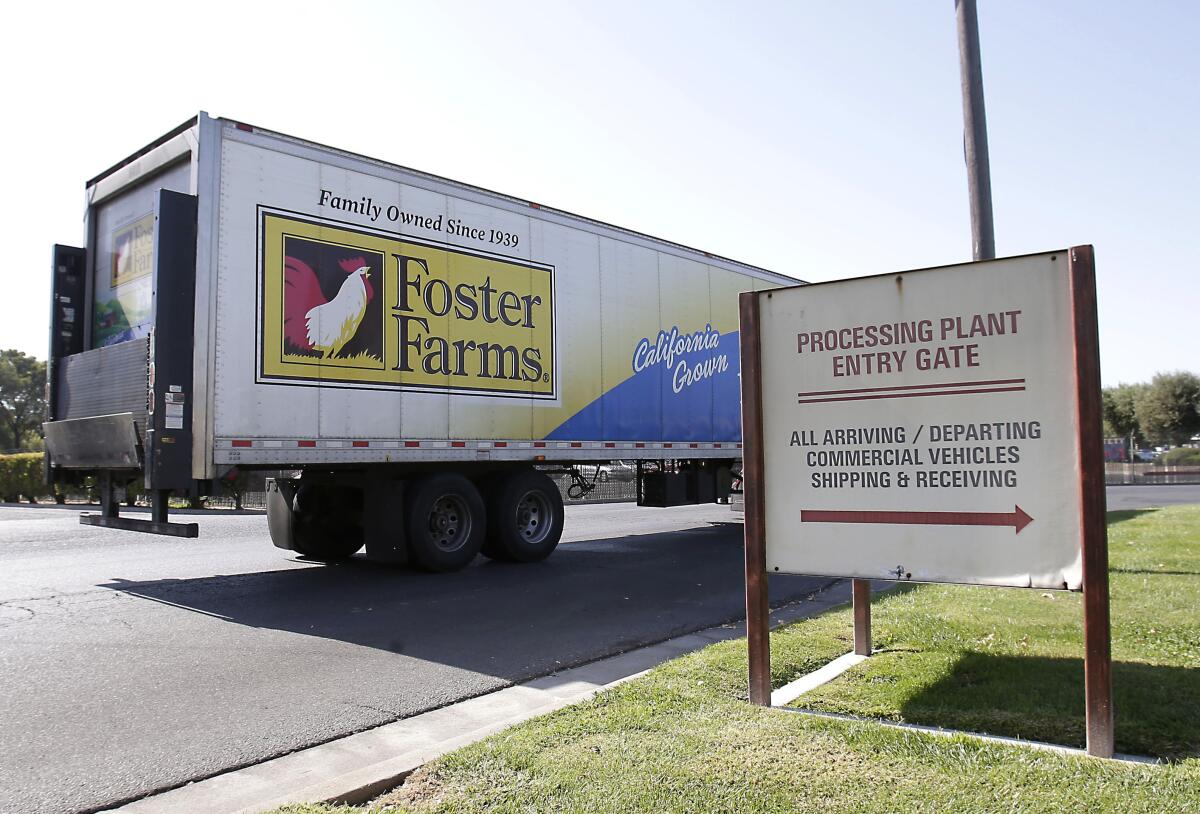Cal/OSHA proposes nearly $300,000 in fines tied to Foster Farms COVID-19 outbreaks

- Share via
SAN FRANCISCO — In the wake of deadly COVID-19 outbreaks at poultry processing plants operated by Foster Farms in California’s Central Valley, the state’s health and safety agency is proposing nearly $300,000 in fines.
Foster Farms, one of the West Coast’s largest producers of poultry, faced ongoing outbreaks of COVID-19 during the pandemic. By the end of 2020, 12 Foster Farms workers had died.
The fines announced this week, which total $292,700, relate to Foster Farms’ Livingston facility in Merced County, where nine workers died last year. Merced County health officials in August ordered the Livingston facility closed temporarily, citing an outbreak that had persisted for at least two months and a failure to complete widespread coronavirus testing of workers.
Separately, an additional three people who worked at the Foster Farms Cherry Avenue plant in Fresno also died.
The California Division of Occupational Health and Safety, known as Cal/OSHA, proposed penalties of $181,500 to be levied on Foster Farms and $111,200 on four staffing companies. Two of the staffing companies that were issued proposed penalties — Human Bees and Marcos Renteria Ag Services — have already filed an appeal, and Foster Farms is expected to appeal, according to Erika Monterroza, a spokeswoman for Cal/OSHA.
Employers can request a reduction of penalties through abating violations or appealing the citations within 15 days, according to Cal/OSHA. Employers may also appeal the citations to the California Occupational Safety and Health Appeals Board, state officials said.
Foster Farms declined to comment. In December, a Foster Farms spokesman, Ira Brill, defended the company’s safety record and said it had instituted a stringent policy of testing and screening employees for COVID-19 symptoms.
Foster Farms and staffing company Human Bees were issued regulatory violations for their failure to promptly report fatalities, according to Cal/OSHA. The state agency also issued serious violations relating to a failure “to properly communicate, assess, correct and train on COVID-19 workplace hazards.”
The shutdown of the Foster Farms plant this week due to coronavirus deaths exposes lapses in one of the most dangerous workplace sectors.
Labor experts and advocates for workers have said the deaths show a need for authorities to pay greater attention to workplace safety in the Central Valley. Critics say officials have long paid insufficient scrutiny to workplace safety hazards in this part of California.
Although the Central Valley has among the highest number of complaints and accidents, workplace safety inspections in this part of California have yielded fewer violations per inspection than other parts of the state, said Ana Padilla, executive director of the UC Merced Community and Labor Center.
“This suggests that there is a regional disparity to enforcement with regards to Cal/OSHA complaints and inspections,” Padilla said.
In addition, it’s worth noting “that it took 10 months for Cal/OSHA to issue penalties,” Padilla added, which, “more than anything underscores really the grave need to allocate greater resources or strategies for regulating workplace health and safety.”
The people who work in the meat and poultry processing workforce are largely nonwhite and immigrant, and there are issues with workers not knowing their rights and facing language barriers to filing safety complaints, Padilla said.
Padilla also questioned whether issuing the kinds of financial penalties that are ordinarily levied will be enough to change how businesses behave.
“Many companies can do a simple cost-benefit calculation and find that they profit more by disregarding rules. And many companies also appeal and fight every penalty and violation and get a reduction,” Padilla said. “We need penalties that would make the deaths of workers a consequence that no company would consider.”
For now, California workers must continue to wear masks and practice physical distancing — either in a room or outside.
Poultry workers at the Foster Farms’ Livingston plant are predominantly Latino and Punjabi Sikh. Deep Singh, executive director of the Jakara Movement, a Central Valley youth and family nonprofit that works with the Punjabi Sikh community, welcomed Cal/OSHA’s action but also called for more scrutiny by the government — including criminal investigations if applicable — to scrutinize what he called “callous decisions to put profits over people.”
For a company with vast resources, the proposed fine “is a slap on the wrist,” Singh said. With California headed toward fully reopening its economy, there also needs to be an effort “to understand what created so many breakdowns, especially for corporations that did not prioritize their worker safety.”
Singh said that one worker who died was employed at the Foster Farms Fresno plant and was of Punjabi descent and in his 60s. He was close to retirement but continued to work when called up by the company, agreeing to cover for coworkers who had fallen sick.
His family believed he was infected at the plant because he and the rest of them had avoided going out into the community other than for work or other essential reasons, Singh said. The worker got sick with COVID-19 and spent his last three weeks in an intensive care unit before dying just before New Year’s Eve.
“He had a certain loyalty to the company, and it cost him his life,” Singh said.
The Central Valley has the most animal-slaughtering and processing industry jobs of any region in California, according to an analysis by the UC Merced Community and Labor Center.
The U.S. Centers for Disease Control and Prevention quickly identified multiple outbreaks among meat and poultry processing workers around the country early on in the pandemic. “Their work environments — processing lines and other areas in busy plants where they have close contact with coworkers and supervisors — may contribute substantially to their potential exposures,” the CDC said.
More to Read
Sign up for Essential California
The most important California stories and recommendations in your inbox every morning.
You may occasionally receive promotional content from the Los Angeles Times.













